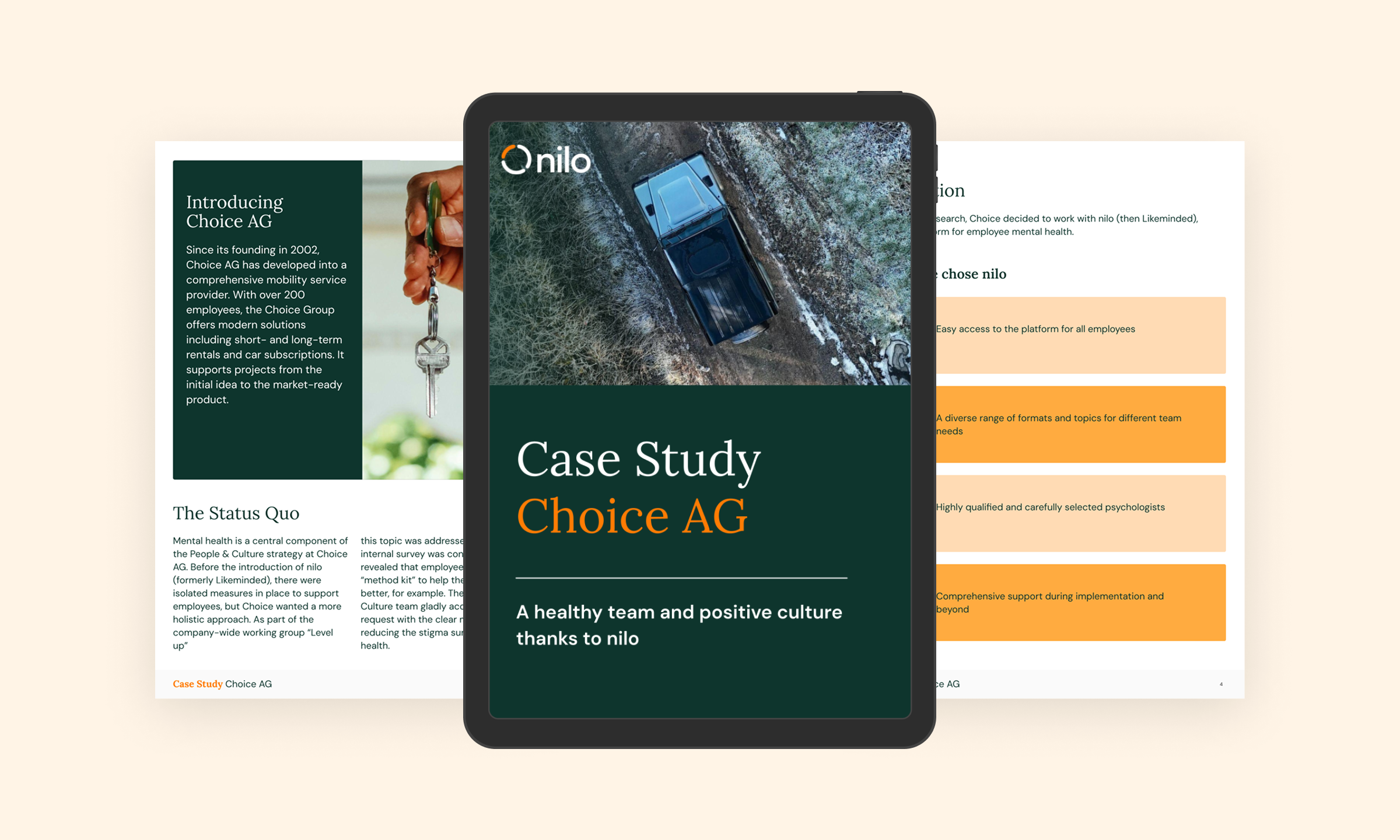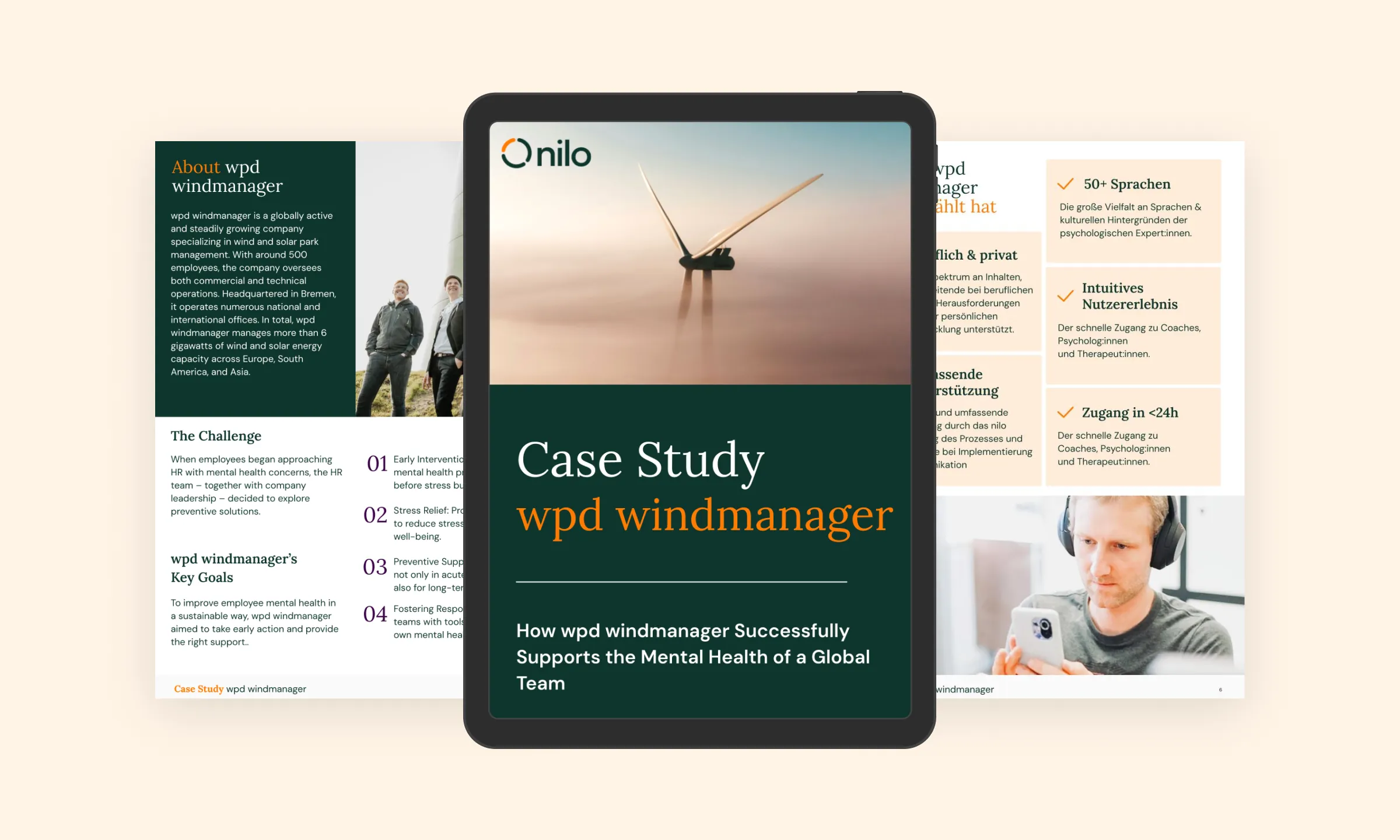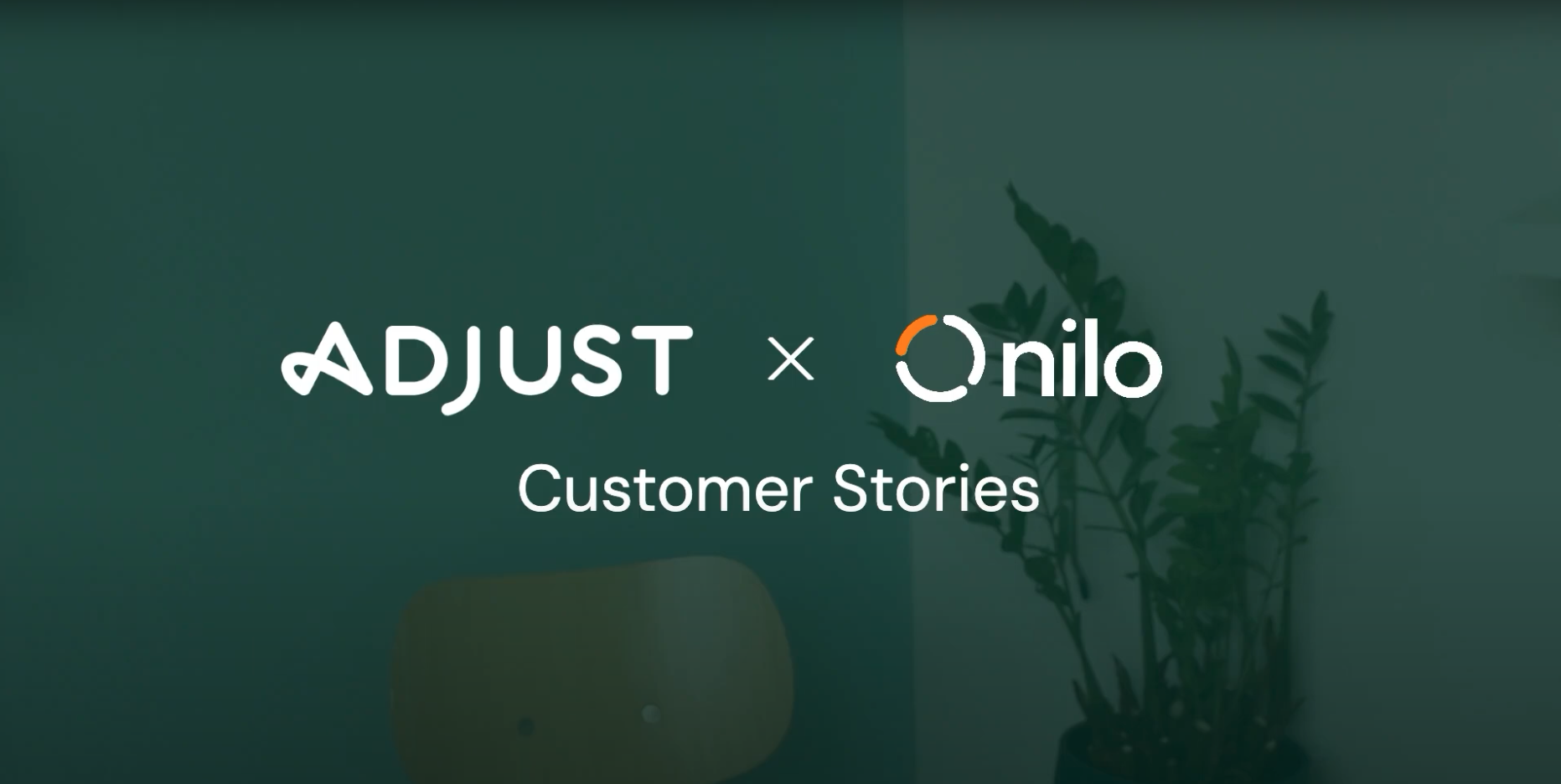TIER is a Berlin-based mobility company working with cities, public transport operators and communities for a clean and sustainable future. For the last year, they’ve offered nilo as an employee benefit to their workforce—and they’ve been loving the results. We caught up with Teresa Dinges and Katrin Keilig from TIER’s people team to talk about a year of nilo, integrating mental health support at work and what they’ve learned along the way.
Hi! Could you please introduce yourselves and TIER?
Teresa Dinges: My name is Teresa, I work at TIER as the Learning and Development Manager. I’ve been working with TIER for more than three years, and Katrin and I implemented nilo over a year ago now.
TIER is a micro mobility provider. We are active in more than 20 countries and 500 cities over the world and our mission is to change mobility for good. We want to offer a climate-neutral alternative to inner-city transport.
Katrin Keilig: I’m Katrin, I’m the Director of Health and Safety and Workplace Experience. I started with TIER almost two years ago. My interest is in improving mental health and the work environment so people can be motivated and feel they have a good culture.
You’ve led right into what I wanted to talk about next! Why are mental health and work so connected and why is it so important that we talk about the two things together?
Teresa: We think that our mental health is as important as our physical health. But it hasn’t always been recognised as such. At TIER one of our aims is to create and maintain a supportive work environment where everyone can be healthy both physically and mentally. We work in a very fast-paced and ever-changing environment and we have a very young workforce as well. As much as this is fun, we also need to take care of each other and be outspoken about our mental health, which we encourage our colleagues to do. Especially today in our current geopolitical, environmental and economic situation, we clearly see how mental health affects our people. So we didn’t have to think twice about offering mental health support and help to everyone who needs it.
How do you incorporate mental health support into your company culture at TIER?
Teresa: We have an internal supporting network, with a lot of different channels and supporting functions within the company that people can turn to. And then we have nilo as an external support, where we encourage people to talk about their mental health openly. And they actually do! Which I’m always very positively surprised about, it makes me happy.
Katrin: We also just recently organized a Mental Health Awareness month and we were so positively surprised that so many people joined different sessions. We didn’t want to celebrate just [World Mental Health Day, on October 10th], but a whole month, because we wanted to put the focus on more than just a one-off session. So we organized lunch sessions, we did stretching, we had a karaoke session. We tried different things, because I believe that mental health does not necessarily mean a psychological session, it can mean exercise and multiple other things. We received so much positive feedback, and so many people joined the sessions. In the weekly company survey people specifically said “that was the best thing that happened in the last month, that I joined the lunch session, that I went to that karaoke party”.
And we were super lucky that nilo did two sessions informing our employees about the nilo service again. We have a high turnover rate, and new joiners should know that there is such a service. So we did the two sessions and we clearly saw afterwards that again the booked sessions increased. Maybe also for different reasons, but we also see that anytime we offer something connected to nilo, there’s a clear uptick in people using them.
Why did TIER decide to invest in the mental health of their employees? Was there a particular moment or a long-term strategic project? How did the conversation start?
Katrin: As I said, I joined TIER almost two years ago and I have a partial background in mental health. And I recognized that people were mixing up different terms, for example using “burnout” for other conditions. It was during the pandemic, so I felt like people really needed to talk about this, but they were using the wrong terms. I thought that some psychosocial education on it would open some channels. This was something that I could help with, but we are not therapists. It’s more important that we tell the people to seek help, rather than saying “oh Teresa, I feel like this could be Generalized Anxiety Disorder” – that’s not my job to do! My job is taking care of other people and letting them know if I feel they need help. So that was my personal approach.
Teresa: Katrin did that internally, but then the next step would be seeking professional help, so the connection to nilo was perfect.
Another thing I want to add is that TIER is a very young company. We were founded in 2018, picked up speed in 2019, and then all of a sudden 2020 came and with it the coronavirus crisis. So COVID-19 has accompanied us for a very long time and when we first started talking about mental health support, COVID-19 was already there. At TIER we can’t really think about mental health without thinking about the pandemic.
What is TIER’s biggest challenge at the moment?
Teresa: Like a lot of other companies, we’re dealing with the current economic situation. It’s definitely one of the bigger challenges at the moment and it weighs on our colleagues. We’re also integrating other teams from a recent merger, which is not an easy task! And we’ve seen nilo being used a lot right now.
Why did you choose nilo as the mental health benefit for your company?
Teresa: We looked at a lot of different providers, but nilo was the one that spoke to us the most. It’s a young company, I like the fact that it normalizes speaking about mental health, it offers very easy access to counseling and I also really liked the self-learning content. Another thing was that nilo offers a lot of different counselors who speak different languages which is important for our company because we have over 100 nationalities at TIER.
I felt like nilo had the highest standards when it comes to therapists’ education, combined with all the things that Teresa just mentioned: different languages, flexibility, a Berlin-based company, easy to get in contact with.
Katrin: For me it was very important to look at the background of the people offering those sessions. When we offer something as an employer, I feel that it must be very traditional, good people with a high educational standard, because we want to guarantee high quality and make sure that people get help if needed. I felt like nilo had the highest standards when it comes to therapists’ education, combined with all the things that Teresa just mentioned: different languages, flexibility, a Berlin-based company, easy to get in contact with.
What changed since you introduced nilo? Have you received any feedback from your employees so far?
Teresa: We have received a lot of feedback, and it has almost exclusively been positive. Of course there’s also feedback saying we can’t fix everything by introducing a mental health benefit because we also need to work on our company culture, which obviously is true. But from people who have actually taken a nilo session – I have never experienced such gratitude and thankfulness for any benefit or anything we’ve introduced! It really makes us happy and convinced that it was the right choice to go with nilo as our mental health provider.
Sometimes people reach out to me privately and tell me how much they enjoy using nilo, which I like even more. Because that shows me that people talk about it openly, they’re not afraid of telling me “look I’m using this and I’m loving it”. That makes me very happy.
Katrin: We want to ensure that it doesn’t matter if people use nilo because of professional reasons, because of private issues, whatever. We don’t care! As long as they feel well and are motivated to work, that’s what’s important to us. The professional and private is often intertwined, it’s not either/or, it affects their whole life.
Teresa: Sometimes people reach out to me privately and tell me how much they enjoy using nilo, which I like even more. Because that shows me that people talk about it openly, they’re not afraid of telling me “look I’m using this and I’m loving it”. That makes me very happy.
What would be your advice to a HR person thinking about introducing a mental health benefit?
Teresa: I would say don’t think about it, try it! Go for it! We have shared the overwhelmingly positive feedback from our colleagues and I just think it’s incredibly important.
Katrin: It also helps us to perform our roles better, in organizing, in supporting, in telling people “okay, if you have a problem, try this”. We love to help and sometimes I feel like we try to fix the issues ourselves, but it’s so nice to say, “this is what we have, they are the professionals, make use of the offer if needed”. Otherwise we are here to help you!







